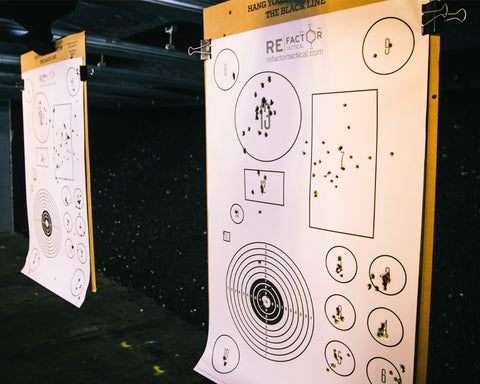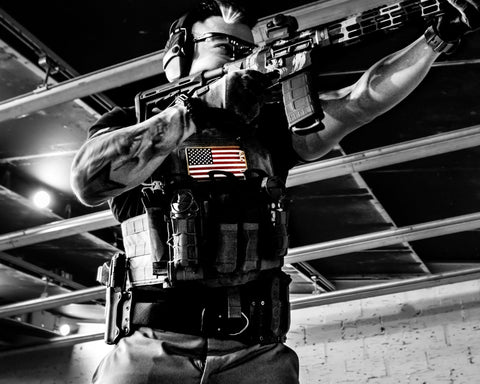When traveling to unfamiliar areas, whether it be a new city within the United States or traveling abroad, it’s important to travel smart in order to not present yourself as an easy target. The main topic to keep in mind when traveling: Blend in. We’ve all been there, walking around in a familiar city and you can easily pick out a tourist.
Don’t Be a Target: Travel Smart
Map and camera in hand, asking for direction, closely studying the local public transportation maps at each stop or enjoying the sights and sounds of their newly found attraction, while the locals are hustling by. The next few topics are those that should be researched and studied before traveling to keep yourself from being an easy target.

Airport Arrival
- Upon arrival, follow the baggage claim signs and walk confidently to claim your luggage. You didn’t travel all this way to stop and take photos in the airport.
- Research the location of the rental car business. Know if it’s on or off the airport property. Do you need to take a shuttle to get your car?
- Research taxi fare costs from the airport to your hotel. If you’re taking a taxi from the airport to a popular tourist spot, the taxi driver will already know an estimated amount of fare. Ask before you get in the taxi. Make sure the driver starts the meter. Don’t arrive at your hotel to find out that a 10-minute ride just cost you $50.
- Always carry a paper map along with a smartphone map to better understand an unfamiliar area. Being aware of general directions will greatly help with an overall confident appearance in public. Simply stating to a taxi driver that you would rather take 10th Street instead of Washington Avenue, sets the tone that you know your way around and you won’t be hustled.
- Always walk straight to the first taxi in line. If you are encouraged or pushed by the taxi attendant to another taxi waiting nearby, insist on taking the first taxi that any local person would use.
- Take a screenshot/photo of a paper map in case you lose cell phone/GPS coverage while traveling.
Public Transportation
- Understand the local public transportation systems: Walking confidently from stop to stop or transfer to transfer, gives the appearance that you’re a local. Locals tend to carry fewer valuables than a traveler does.
- Research payment methods: Knowing what the local bus or train fare is before getting on board will help you blend in. Just think, do local routine bus riders have to stop and ask the driver how much it costs to ride? Nope, but travelers do.
Hotel
- Pick a hotel in a well-populated and lit area. Even though you may be in a tourist area, you’re chances of being a victim as a tourist are less likely in an area with many tourists rather than an area where you’re the only tourist.
- Know all emergency exits at your hotel. Don’t be afraid to play the dumb tourist and walk into an “employee only” door to find out if there are any additional exits to the hotel.
- Use any secondary locks on your room doors when you’re inside. There are a few secondary door stops that you can travel with which are inexpensive to purchase.
- Take all valuables with you when leaving the room, no matter how long you will be gone.
- Buy a local prepaid phone from a foreign country. Put the local police, nearest hospital, your hotel, and United States Embassy phone numbers in your newly purchased prepaid phone. In the event of an emergency, you don’t want to find out that your personal phone doesn’t work in the area you’re at.
- Attempt to get a second-floor room. A second-floor room is low enough to jump from during an emergency but less accessible from the outside.
- Monitor what nationalities are in adjacent rooms. Is the hotel rooming all Americans adjacent to each other? Are these rooms being monitored?
Valuables
- Use traveler’s checks or carry multiple debit/credit cards when traveling. Ask friends/family to carry some of your cards and carry theirs in case someone loses a wallet.
- Photocopy everything in your wallet. That way if your wallet is stolen, you’ll have copies of all your cards and identification to report stolen/lost.
- Save a copy of all your photocopies in an email. If you lose everything, you can always access your email account and print identification documents.
- Don’t show large amounts of cash. Carry minimal spending cash in your front pocket to use for general purchases. Don’t pull out your wallet with all your money to purchase a $5 item.
- Carry your wallet with minimal items in it in your front pocket. You are less likely to have your wallet stolen if it’s in your front pocket.
- Avoid flashy jewelry and watches. “Bling” catches a thief’s eye.
- Carry a paper map and mark all the danger zones, police stations, hospitals, and the United States Embassy on it.
Embassy
- Report to the Embassy for any lost/stolen passport issues. Present a photocopy of your passport to further expedite getting a new one.
- Report to the Embassy for any non-medical emergency related issues. In the event of medical issues, seek medical attention at a local hospital but also contact the local Embassy for further medical guidance.
- Visit the Department of State website and research the country you are traveling to in regards to the area risk assessment. http://www.state.gov/
Saber Security Solutions
At Saber Security Solutions, we provide law enforcement and military with the latest surveillance training and techniques. The topics listed above are just a few of the topics covered in our many surveillance courses that teach surveillance personnel to enter an unfamiliar area, get in and get out without being detected or compromising a case. Not only do these security measures provide for the safety of your team, they are applicable if not necessary for maintaining your cover and protecting the longevity of your surveillance operation.
For more information on courses at Saber Security Solutions, please visit our website at www.sabersecuritytraining.com.






Leave a Reply
Your email address will not be published. Required fields are marked *